This post may contain affiliate links. Please read our disclosure policy.
Learn how to make your own vegan butter at home! This vegan butter smells and tastes exactly like real dairy butter! It is spreadable, melts, and is perfect for baking. Plus, it’s cheaper than store-bought, and you know exactly what is inside!


After camembert, blue cheese, and yogurt, now comes butter. It’s starting to feel like a real creamery here!
The recipe was supposed to be released long ago, but I kept tweaking it because I was not fully satisfied with the texture.
I tried many recipes for vegan butter but couldn’t find one that smells, tastes, and spreads like real dairy butter. So I had to make my own version. I don’t claim to have created cultured butter, though, since there are already recipes that rely on yogurt to give the butter a tangy flavor. Anyway, this butter is flavorful, has the perfect texture, and is soy-free, dairy-free, and palm oil-free. Did I mention it also melts like real butter?
After researching how butter is made, I found out it’s actually a fermented product. Did you know that? I didn’t. But we know making fermented food is easy, right? So, ready to make your own butter?
📘 Why Make Your Own Butter?
There are several advantages of making your own vegan butter from scratch:
- Ingredient control: Did you know that over 80% of vegan butter available in supermarkets contains palm oil and flavorings? By making your own butter, you know exactly what you put inside, meaning no palm oil, flavorings, or preservatives. And you can flavor it! Add chives and garlic for a savory spread or cinnamon and raisins for a sweet treat.
- It’s a fun process! Don’t be scared to try it. This recipe is straightforward. The only thing is that it requires some patience, like any fermented recipe.
- Save money: Vegan butter alternatives can be quite expensive and not available everywhere, especially if you live in a small town. You can make your own butter anytime with just a few ingredients from your pantry. I quickly calculated, and the cost for 16 ounces of butter is around $5,8. This is over half the price of store-bought vegan butter!

🥥 Ingredient Notes
This vegan butter recipe requires just 7 ingredients. Here is what you will need:
- Raw cashews – We will be using raw cashews to make cashew milk and ferment it with probiotics.
- Probiotics – Acidophilus probiotics will allow the cashew cream to ferment and get a subtle tanginess.
- Refined coconut oil – Coconut oil will help the butter firm up in the fridge. Do not use regular coconut oil. The flavor would be overpowering. Instead, use refined odorless coconut oil.
- Grapeseed oil – You can also use sunflower or canola oil.
- Sunflower lecithin – Lecithin is mandatory. Without it, the cashew cream will separate from the coconut oil, and you will end up with two different layers. Definitely not what you want! You can also use soy lecithin if you prefer. Both work.
- Salt – To enhance the flavor of the butter. In my opinion, 1/4 tsp of salt is the perfect amount, but feel free to adjust to your taste.
- Carrot juice – Optional, for the color. I first tried using turmeric to give it a yellow color, but it didn’t look natural. Too yellowy. So I went back to testing, and I found out carrot juice gives it a nice beige color, don’t worry, you can’t taste the carrot! Note: You can use half of a teaspoon of annatto oil instead of carrot juice to give your butter a nice beige/yellow color.
🥣 How to Make It
This recipe consists of two steps: 1) Making the fermented cashew milk and 2) Blending it with the rest of the ingredients.
Cashew Milk
It starts with the cashew milk that we will let ferment to get a tangy flavor.
- Make the milk. Start by blending soaked raw cashews with water and cultures.
- Ferment it. Then, transfer the milk to a clean bowl, cover it with plastic wrap, and let it ferment at room temperature for 24-48h, depending on the temperature of your house.
- Taste it. After about 24 hours, you should see some air bubbles in your cashew milk. This means the fermentation worked. Once your cultured cashew milk has a subtle tanginess, it’s ready to use!
Why Culture the Cashew Milk?
Culturing the cashew milk gives the butter a tangier taste, a more complex body, and a richer texture. It’s the secret to making it smell and taste like real dairy butter!


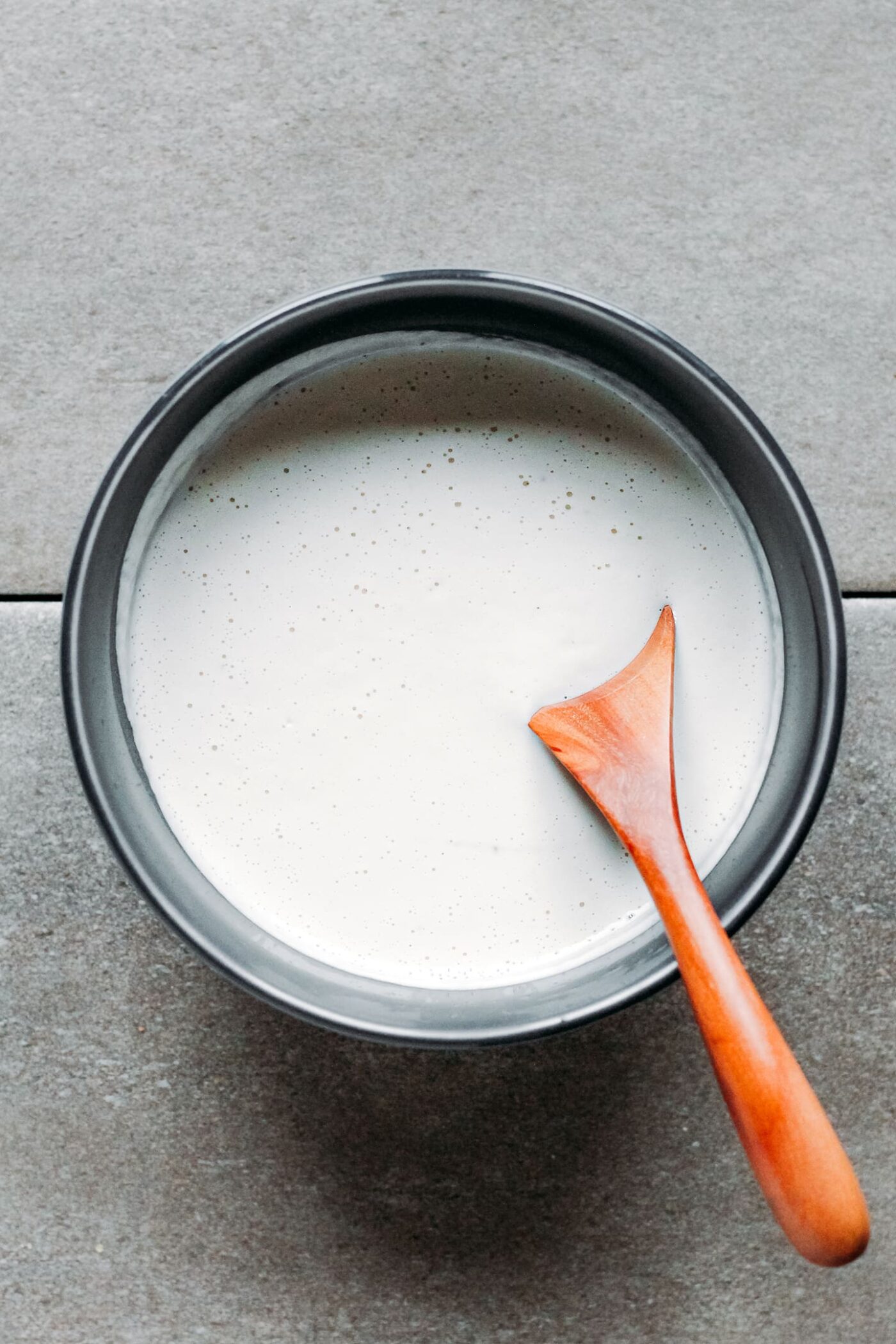

Making the Butter
The next and final step is preparing the butter itself:
- Melt the coconut oil over low heat. You don’t want the oil to be hot, just melted.
- Add the cultured cashew milk, melted coconut oil, grapeseed oil, lecithin, carrot juice, and salt to a high-speed blender.
- Blend for about 1 minute or until smooth and fully combined.
- Transfer to a container lined with parchment paper and refrigerate for a few hours or until firm. Alternatively, you can place the container in the freezer for about one hour if you want to speed up the process.
- Your vegan butter is now ready!
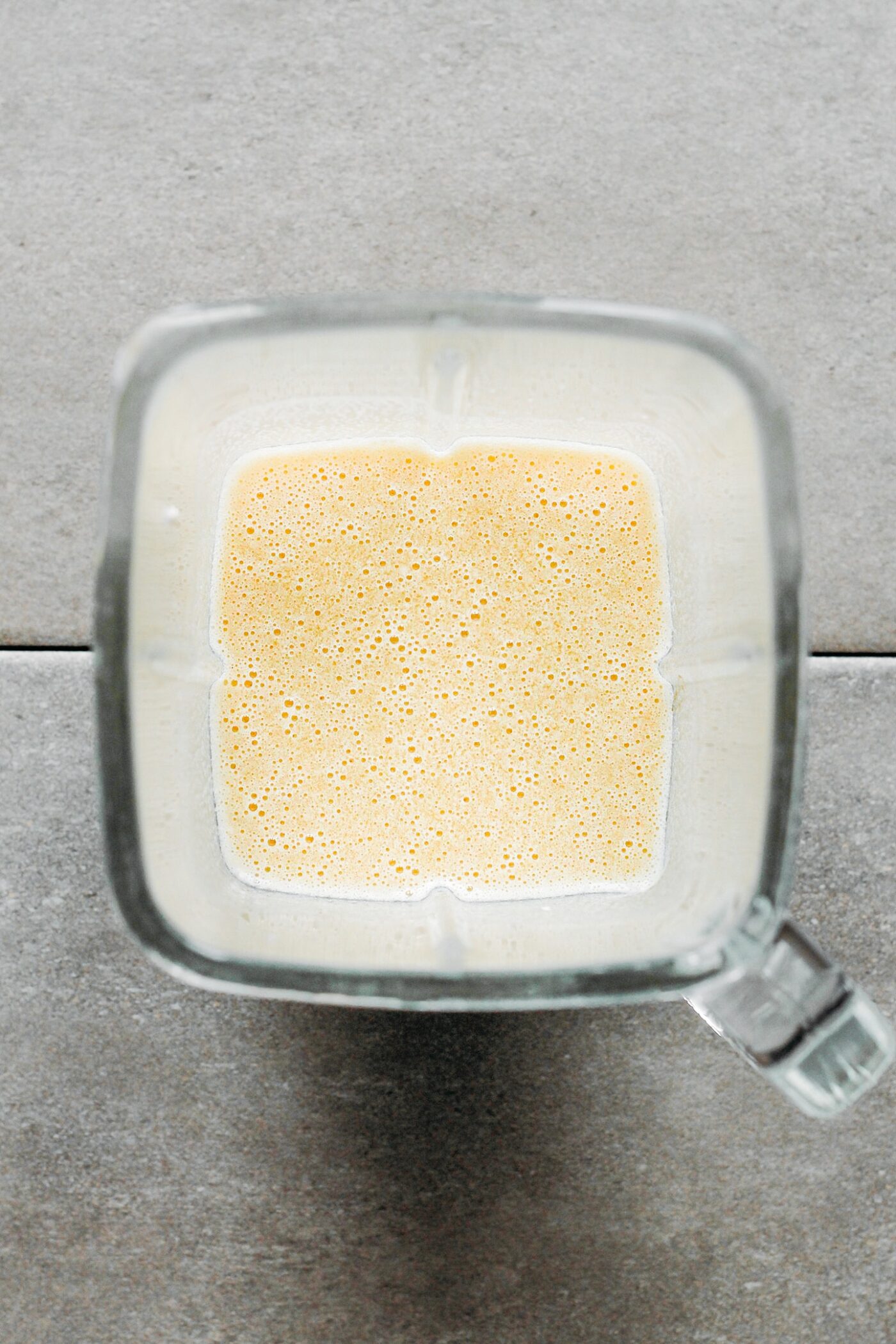

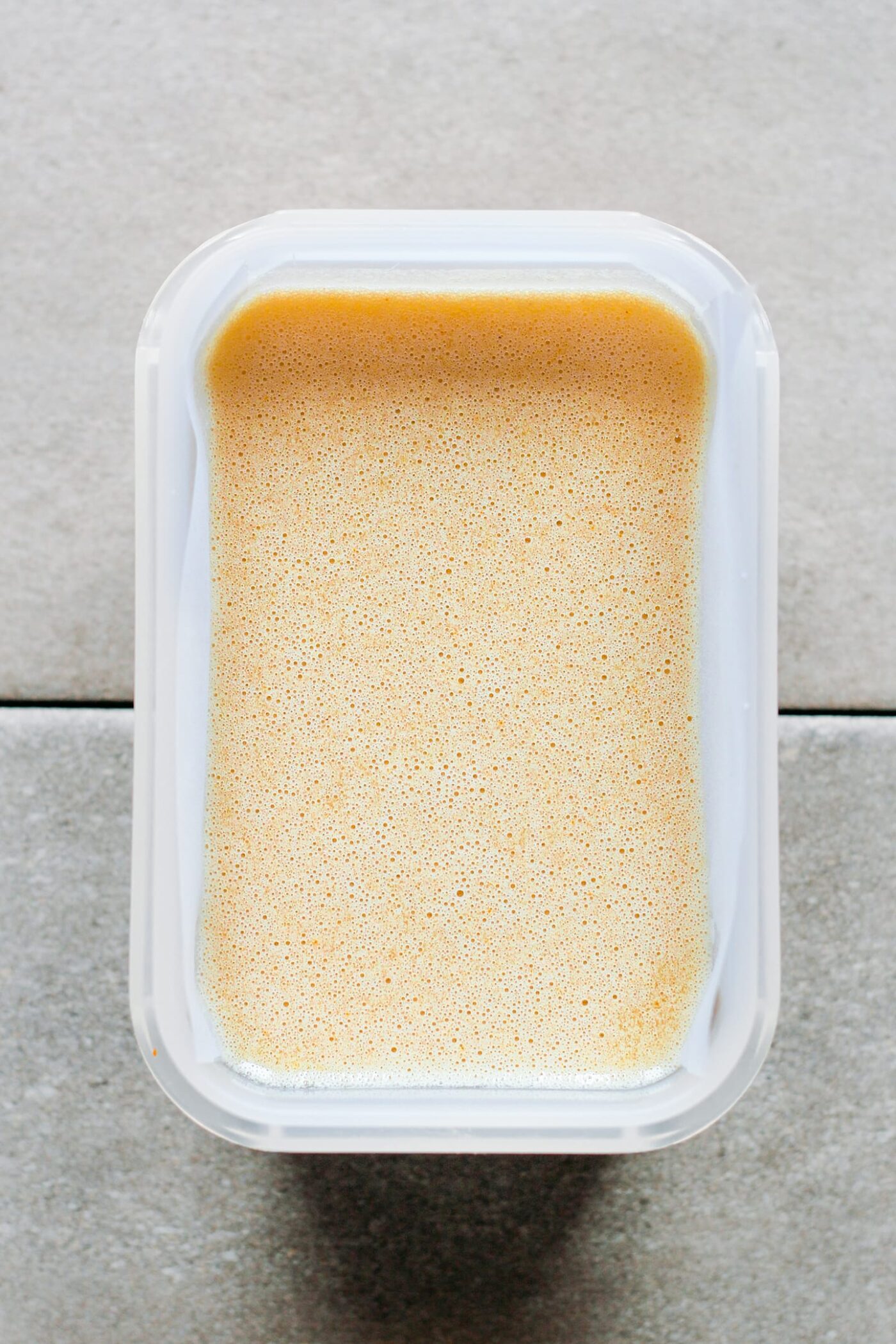

Since this butter is traditionally cultured, it won’t keep as long as margarine. You can keep the butter for up to 7 days in a fridge.
❄️ Freezing
You can keep this vegan butter for up to 2 months in the freezer. I recommend cutting it into small cubes and then thawing just what you need.
🥞 Where to Use It
You all know where to use butter, but here are a few ideas of what you can do with it:
- Breakfast: Spread on warm toast and sandwiches, top your pancakes, or even stir into oatmeal. Breakfast will never be the same!
- Use in baked goods: Perfect for Chocolate Chip Cookies! Banana bread, cupcakes, pies, caramel sauce, the possibilities are endless. Oh, and what about puff pastry?
- Make the frosting: Yep, you can use this butter to make buttercream frosting the traditional way. It will be soft and fluffy.
- Brown: I successfully made brown butter from it. You have to be careful not to burn it, though. Then, use it in cookies, sauces, etc.
- Add a flavor: Stir in risotto before serving, add to sauces, or melt on vegetables, a knob of butter will take your meal to the next level.


📔 Tips
- Do not overheat the coconut oil. To prevent separation during blending, the coconut oil should be just melted and not hot.
- Use refined coconut oil. Since coconut oil is this vegan butter’s main ingredient, you absolutely need to use the odorless/flavorless kind. Using regular coconut oil would give the butter an overpowering coconut flavor.
- Regarding lecithin: This emulsifier is what allows the cashew cream and different oils to blend together. I tried using both sunflower and soy lecithin, and both work great.
- Replacing the acidophilus: You can replace the capsule of Acidophilus with 1/16 teaspoon of mesophilic culture.
- To flavor this vegan butter: Follow the recipe as stated. Once firm, let the butter sit on the counter for 1-2 hours or until soft. Stir in your add-ins (herbs, garlic, raisins, cinnamon, or chocolate for a sweet version) and transfer the butter to a container. Place in the refrigerator until firm again.
💬 FAQ
Unfortunately, no. Lecithin is essential to emulsify the oils and the cashew milk. It prevents it from separating.
Yes, if you are short on time, you can skip this step and simply use the cashew cream. Your butter won’t taste as buttery but will still be delicious.
Yes! It melts just like real butter, so you can use it to make sauces or stir-fry veggies.
While I haven’t personally tried it, I have no doubt it will work just like regular butter!
It will keep for about one week in the refrigerator. After that, I found it a bit too tangy.
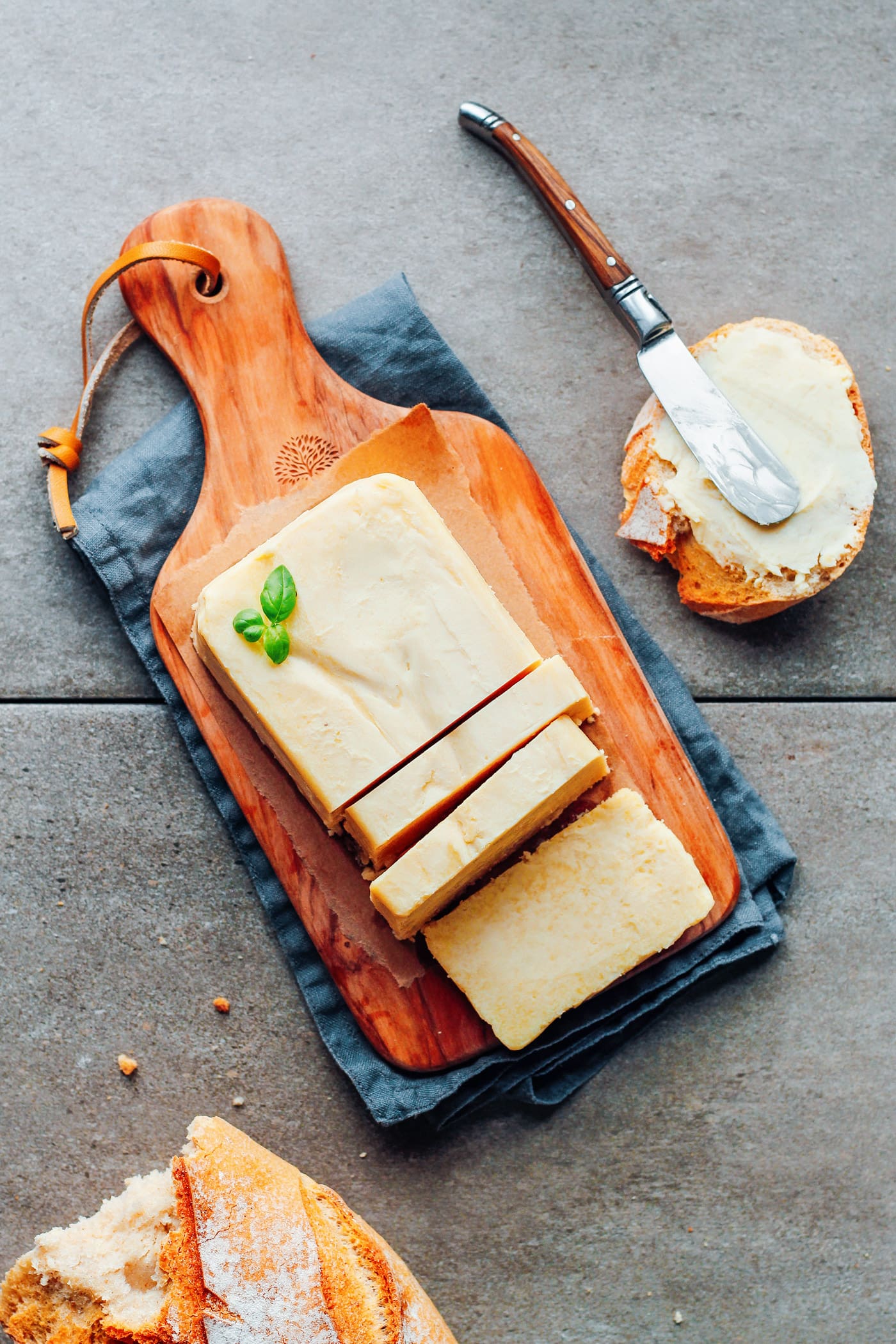

I hope you are going to love this plant-based butter! With over 75 ★★★★★ ratings, it’s definitely a must-try!
Thick, creamy, and soft, this vegan butter has the perfect texture. It’s spreadable right from the fridge and works so well in baked goods!
⭐️ Did you like this recipe? Let us know in the comments below, and tag us on Facebook, Instagram, or Pinterest!
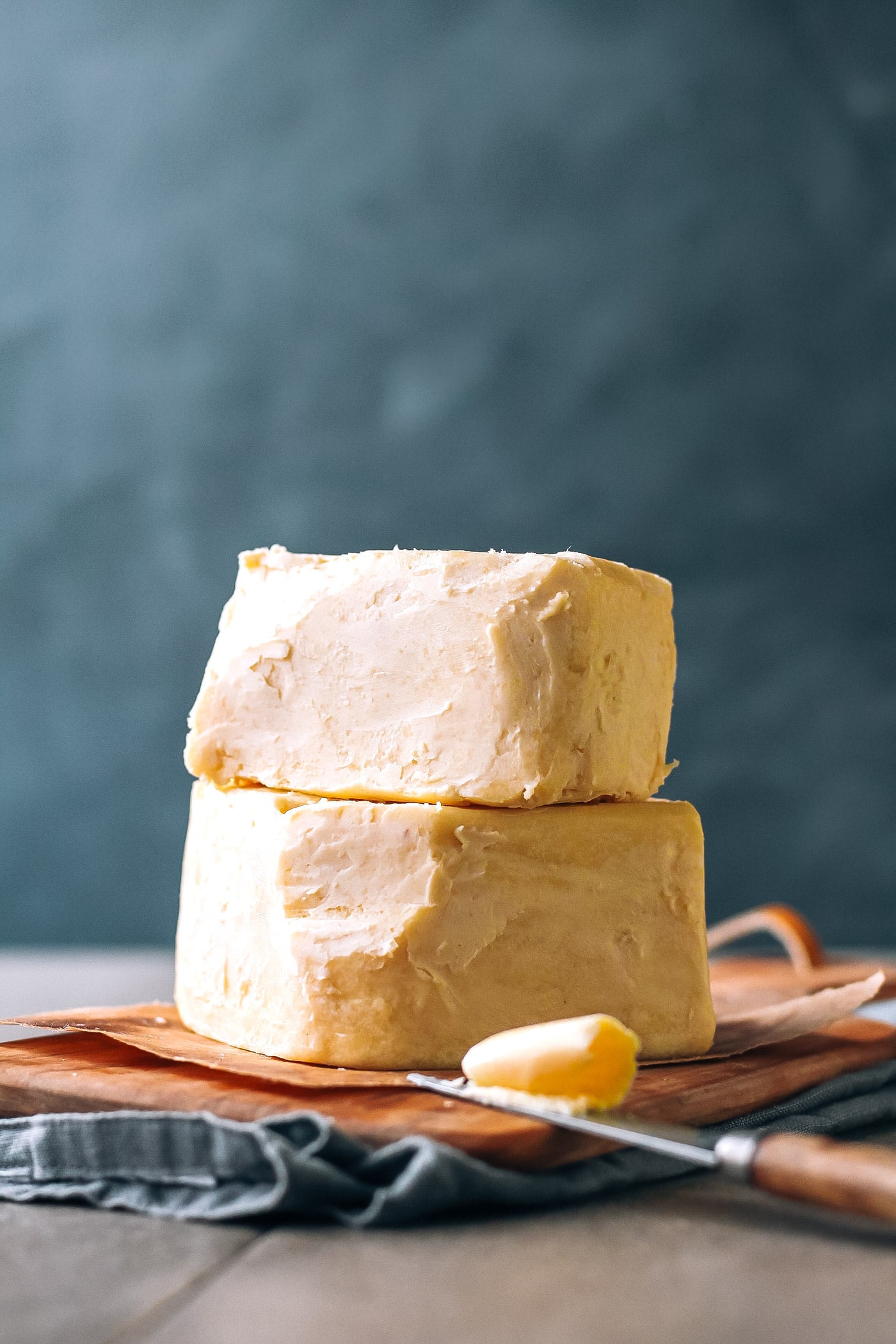



Want to Save This Recipe?
Enter your email below & we’ll send it straight to your inbox! Plus, you will receive new recipes every week!
I’d like to receive more tips & recipes from Full of Plants.
This site is protected by reCAPTCHA and the Google Privacy Policy and Terms of Service apply.


Homemade Vegan Butter (Cultured!)
Cultured Cashew Milk
- 1/2 cup raw cashews
- 2/3 cup water
- 1 capsule acidophilus (or 1/16 tsp of mesophilic culture)
Cultured Butter
- 1/2 cup cultured cashew milk
- 1 and 1/4 cup refined coconut oil
- 1/3 cup grapeseed oil or other neutral oil
- 1 tsp liquid sunflower lecithin or 2 tsp powdered lecithin
- 2 tsp carrot juice for color, optional
- 1/4 tsp salt
Cultured Cashew Milk
- Place the raw cashews in a bowl. Cover and let them soak overnight or for at least 8 hours.
- Drain the cashews and put them back in the bowl. Bring a pot of water to a boil. Once boiling, pour the boiling water over the cashews. This step will kill viable bacteria. Drain the cashews.
- Add them to a blender with 2/3 cup of water and blend on high speed until smooth and creamy. Scrape down the sides from time to time until everything is smooth.
- Transfer the cashew milk to a small bowl or container and stir in the acidophilus powder. Cover with a clean towel or with plastic wrap and let sit at room temperature for about 24 hours (up to 48 hours). The cashew cream is ready when it has a light tangy taste. You should also see some air bubbles. This means the fermentation worked.
Vegan Butter
- Melt the coconut oil over low-medium heat. Measure 1 and 1/4 cups of melted coconut oil and put it in a blender. Add 1/2 cup of cultured cashew milk, neutral oil, sunflower lecithin, salt, and carrot juice. Blend on high speed for about 1 minute.
- Line a 6×4-inch container with parchment paper. Transfer the mixture to the container and place it in the freezer for at least 1 hour or until firm. Once firm, transfer to the refrigerator. It will become softer after a few hours.
- This vegan butter will keep for up to 7 days in the refrigerator. Since this butter contains live cultures, it might get stronger in taste/smell as time passes. It will keep in the freezer for up to two months.

- Do not overheat the coconut oil. To prevent separation during blending, the coconut oil should be just melted and not hot.
- Use refined coconut oil. Since coconut oil is this vegan butter’s main ingredient, you absolutely need to use the odorless/flavorless kind. Using regular coconut oil would give the butter an overpowering coconut flavor.
- Regarding lecithin: This emulsifier is what allows the cashew cream and different oils to blend together. I tried using both sunflower and soy lecithin, and both work great.
- Replacing the acidophilus: You can replace the capsule of Acidophilus with 1/16 teaspoon of mesophilic culture.
- To flavor this vegan butter: Follow the recipe as stated. Once firm, let the butter sit on the counter for 1-2 hours or until soft. Stir in your add-ins (herbs, garlic, raisins, cinnamon, or chocolate for a sweet version) and transfer the butter to a container. Place in the refrigerator until firm again.
- Recipe inspired by Miyoko’s VeganButter and Nutcrafter’s Bettah than Buttah, as well as traditional butter-making techniques.


About the Author
Thomas Pagot is the founder, photographer, and recipe developer behind Full of Plants. He created the blog in 2016 as a personal cookbook for vegan recipes. Through years of recipe development, Thomas has successfully grown Full of Plants into a trusted resource for plant-based recipes.


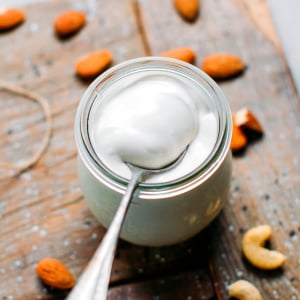


Leave a Comment
Thank you for sharing a good recipe.
I need your advice.
Butter melts too easily and falls apart
Isn’t there any way to solve it?
Would it be helpful to put agar in here?
What do you mean melts too easily? The butter is supposed to melt.
If you want it firmer at room temperature, I would suggest using more coconut oil and less grapeseed oil.
I don’t recommend using agar. Have you used the lecithin?
Amazing butter 🙏🙏🙏
Thanks Svetlabay!
For anyone wanting to use all of the cashew cream that gets made (it comes to 11 oz)…you then need 27.5 oz coconut oil, ~7 oz grapeseed oil, 2.75 tsp lecithin, 5.5 tsp carrot juice, ~3/4 tsp salt
I have tried this several times and always get the coconut oil too hot (no matter how slow I go) and mine always separates. BUT there is a solution: an ice bath. After final blend of everything, pour into several 1/2 pint mason jars that have tight lids. Create an ice bath where all of your jars can float in the water. Take each jar and shake it for ~20 times, then put back in the bath, do the next, then the next. Keep doing this until you no longer feel the butter moving (it stays in solution and has thickened). Now it is ready for fridge or freezer for use.
Great recipe, love making the big batch for butter in my freezer at all times!
Thanks for sharing your tweaks April 😉
I just have a question, if one were to substitute the coconut oil for something else in order to avoid the high saturated fat content, what would you suggest? I understand it wont be as solid but thats okay
I’m afraid replacing the coconut oil is really hard, as it’s essential to make the butter set. You may try playing with deodorized cacao butter, but I believe you will have to use a bit less. Also, I am not familiar with the saturated fat content of cacao butter.
Hi, I wonder if you can help. I notice on a lot of vegan butters there is “natural flavor” and “mushroom extract” added. Do you know what products these may be? I’ve used the Vietnamese mushroom powder before but it’s super processed. I’d like to find a more natural product.
I think the natural flavor is some kind of “butter imitation”. It’s basically a butter flavoring.
Regarding the mushroom extract, I am not sure about this one.
I made your wonderful butter recipe, my family loves it. We’re all vegan here and can’t bare the taste of margerine. I did add extra salt (1Tbs total) though, reminiscent of salted butter from my childhood days.
Please can you send me the link to download your cheese making book. I’ve tried numerous times without success.
Thank you Thomas
Thanks for your feedback Jaslyn, I’m glad you liked this vegan butter recipe 🙂
Regarding the newsletter, I can see you subscribed in 2020. If you already subscribed before and try to resubscribe, you won’t receive the welcome email with the link to the ebook. Anyway, I resent it to you manually.
J’ai passé une commande aux adresses indiquées dans vos liens et ce matin, j’ai reçu la lécithine de tournesol liquide, le reste arrive vendredi !!! Je vais pouvoir faire le beurre et des fromages.
Quel plaisir, de pouvoir, enfin, passer à l’action et réaliser ces merveilles !!! Déjà, je me régale de tes recettes végétales depuis un bon moment, mais je voulais passer au niveau supérieur, et j’en suis très heureuse. Je tiens à te remercier, car ton site est inspirant et si riche d’informations et de recettes, que je n’aurais pas assez d’une vie, pour tout explorer !
Je suis française, et je suis végétalienne depuis 45 ans, tu n’imagines pas l’univers que ton site à ouvert pour moi, je suis ici comme “Alice au pays des merveilles” c’est fabuleux ce que vous faites tous les deux, tu as ouverts un champs des possibles et même des réalisables, Merci, Merci, Merci
Je voudrais aussi dire que tes recherches pour une ou des recettes, sont aussi un moyen de dépenser moins, alors bien sur, il faut dépenser de l’argent pour faire certains achats, mais quand on fait les comptes, et bien on y gagne ! Merci pour tes liens, Merci pour les noix de cajou à un prix défiant toute concurrence ! Merci tu as changé ma vie en 100 fois mieux et je mange ce qui me plaît, en accord avec mon être profond, cela n’a pas de prix !!!
J’aime car j’ai du m’absenter quelques mois, et quand je rentre chez moi, je retrouve le chemin de votre site, car oui, maintenant vous êtes un couple magnifique, et j’en suis heureuse pour vous. Vous avez trouvé un moyen de subvenir à vos besoin en aidant les autres à se réaliser dans votre prolongement, puisque nous avons la même vision de la vie, et la partageons séparément, mais toujours lier, par le respect, la reconnaissance et l’amour. Ce qui fait que quoi qui se passe, que quelque voyage que j’envisage, je sais qu’à mon retour, je vous retrouve, vos emails (toujours beaucoup de plaisir à découvrir) et votre site auquel je souhaite une très longue vie, d’innovations, de découvertes, de bonheur à deux et d’Amour !!! Merci d’être vous
Bonjour Chantal,
Merci beaucoup pour votre touchant message, c’est très gentil ^^
J’espère que vous apprécierez les recettes du blog, et vous souhaite du succès dans la fabrication de fromages vegan !
Bonne semaine !
Vân et Thomas.
Dommage que je ne puisse mettre la photo de mes beurres…
Merci Thomas
Can I use olive oil instead of sunflower lecithin?
No, lecithin is a key ingredient that prevents the oil from separating from the cream. It cannot be replaced with olive oil.
I’m very curious if this would actually work for puff pastry, as I saw someone else asked about it too. The bit where the butter is supposed to be bendy is dependent on fat % so it’s a toss up but I do want to try it.
Would avocado oil be neutral enough in place of the sunflower?
I haven’t tried it with puff pastry yet, so I can’t say for sure.
Yes, avocado oil will work too!
Delicious butter. Thanks a kit, Thomas!!
You’re welcome Diana!
As with other people, I have found that store bought vegan butter is just too expensive. My husband was diagnosed with allergies to dairy but also canola and soy, so this is a fantastic alternative. Have made it once and turned out well. Getting things ready to make it again!
Thanks for your feedback Jacqui!
I haven*t done it yet,but L
I love the idea of you butter!Stupid question—–do I litterly pour the contents of the capsule into the cashew cream(the rest of the instuctions are very clear
I have just found you and I think you are very clever.Thanks for being you.Stay
safe…..Alexandria ( ps Have you got a particular culture capsule that you prefer?)
Yes, you add the powder from the capsule to the cashew cream and stir.
Regarding the probiotics, I would recommend Acidophilus.
This butter is fantastic! I have made it a bunch of times now, and mainly use it for making croissants. They turn out great both in taste and texture (even structure of internal air bubbles, very defined layers, etc.). So thanks very much for this recipe (and your cheese recipes)!
One thing I am curious about: I find that by itself, the butter tastes somewhat strongly of the sunflower lecithin. I use a liquid product (by Now Foods) and use the 1 tsp as stated. I am wondering if this is normal, or if perhaps the brand has a strong flavor, or I am just sensitive to the taste (I hate sunflower seeds). The taste is masked when used in cooking and baking, but I can taste it if the butter is spread on bread. Many thanks in advance for any counsel you can give here.
Thanks for your feedback Ash! 🙂
I am also using liquid sunflower lecithin and don’t particularly find that it gives a specific flavor to the butter. Maybe try using a different brand, or use soy lecithin.
Hi Thomas
I have commented on here before – great butter recipe !
Others maybe interested in my additions of nutritional yeast,( which adds a bit of yellow), extra lecithen, ( as it is also a good supplement) and a new soaking cashew practice i have (from yours, but with a twist to keep all the goodness from the soaking) i pour boiling water over the dry cashews – drain, then soak them in rejuvalac water, then i incorporate the nut/rejuvalac water into the butter.
This batch had a lovely buttery smell.
Thanks for all your recipes, the cookies were awesome xx
Hi Aurora,
Thanks for sharing your tweaks! I’m sure rejuvelac adds a nice fermented flavor!
Hi Thomas! 🙂 I tried it today for the first time and actually tried once with cashews and once with almonds. However, in both cases the mixture started splitting when mixing in a blender on high speed for 1 minute. What could be the reason for that? In one of the comments someone mentioned that the same happened to them and they just gave the lecithin a bit more time to dissolve and found that they needed more lecithin to stop it from splitting?
Would love to hear your opinion on this please! 🙂
Thank you so much!
Cheers,
Lee
Hi Lee,
First, make sure your mixture is not hot, otherwise it will separate, that is usually the main reason.
Otherwise, it seems that can happen depending on 1) the brand of lecithin and 2) if the lecithin is in powdered or liquid form. So maybe try making sure the lecithin is perfectly dissolved, and if it still separates, increase a little bit the amount.
Thank you for this wonderful recipe. It would help me a lot if you could indicate the weight of ingredientes in grams. I am Italian and I do not know how much Is a Cup.
Donatella,
You can click on the “Metric” button to switch to grams.
Dear Thomas,
Thank you so much for this recipe! I can’t wait to try making it. Is it possible to avoid using coconut oil at all and to substitute another oil for it?
Thank you,
Rosemarie
Hi Rosemarie,
Unfortunately it’s not possible, coconut oil is essential to the texture, it helps firm it up.
Hi can I make croissants with this butter?
Thanks
Hi Richa,
I haven’t tried but I think it should work!
the links are taking me to different products
Hi Hanna,
Sorry about that, sometimes Amazon is not redirecting to the correct product page if visited from outside the US.
Can I use store-bought cashew milk?
I would not recommend it, there are always gums, preservatives, etc that could cause an issue with the fermentation process.
Made this butter yesterday and I have to say is so so good :P! I love the taste and the fact that is spreadable.
The leftover of the cultured milk was also delicious with oats and fruits. Thank you so much :)! I can’t wait to try your cheeses recipes as I am a former cheese lover haha (Once, when I was little I asked for an assortment of cheeses for Xmas haha).
Thanks so much for your feedback Tania! 🙂
working
Made this today (May 2021) So far so good. I had a couple questions I couldn’t find on the internet.
I used Forager already made cashew milk, which for cashew milk, is a high standard brand. It was in my fridge for several days unopened. When I opened it it tasted like buttermilk in terms of slight sourness. I was wondering if it can ferment in the bottle in the fridge? Couldn’t find an answer on their website.
Anyway I made the vegan butter with what I think is slightly fermented cashew milk. It tastes good but hasn’t hardened yet. I also put 1/2 cup of the same cashew milk on the counter with some plain yogurt to see if I can make a batch with that and if it tastes different.
Does anyone have experience with these issues to share?
I’m not quite sure about your cashew milk, I have never used this brand so I can’t say.
Be aware that commercial cashew milk is probably thinner than the homemade cashew cream, that might affect the texture a little bit. Also, make sure to refrigerate for at least a few hours, it can take a while to firm up.
Hi Thomas, I love your recipes and can’t wait to try this one. But I’m lazy and I already cultured a batch of coconut yogurt this week and one batch of cultured stuff is pretty much my limit for the week. Do you coconut yogurt would work as a sub for the cultured cashew milk? Or does it not have enough protein. Thanks in advance!
Hi Mary, thanks!
I think coconut yogurt will work, but you might have a coconut flavor in your butter. Protein is not an issue though.
Update on this! It worked! A little bit of a coconut flavor if you use a lot of it but since I made this for spreading on toast on the morning its not an issue for me. Miyoko’s level flavorwise but so so so so so much cheaper!!! Thank you so much for this recipe Thomas!!!!
Awesome! So glad it worked for your Mary 😉
Even with the sunflower lecithin my product is separating during cooling! What could be going wrong?
It shouldn’t, may I know which kind of lecithin you are using?
Also, you could try increasing the amount to 1 tbsp and first blend it with the cashew cream before adding the oils.
Another tip, make sure your mixture is not warm otherwise it will separate.
Have you tried using this butter in puff pastries yourself? I see you mention puff pastries in the “How To Use It” section, but I was wondering if you had any first-hand experience using it and what the results were like compared to other vegan butter brands. Thanks for the awesome recipe! 🙂
I have never used it in puff pastry personally, as I find that the effort and time required to make puff pastry is not worth it. The store-bought is just as good in my opinion.
I used this butter to make pie crusts though, and it worked perfectly!
Let me know if you try making your own puff pastry using this butter 🙂
Hi,again you have created a great recipe,thank you.
Is it possible to make butter without coconut oil?,I was wondering if extra virgin olive oil & lecithin would work,with a very thick cashew base.
Thanks Jackie!
I’m afraid your butter won’t have the same texture if using olive oil. It won’t harden the same way, even if your cashew cream is thick.
Excellent recipe – husband is eating it almist as fast as i can make it….
I used a mild tasting cold pressed rape seed oil which had the extra benefit of giving it a lovely buttery colour so i didn’t need carrot juice.
I also used powdered sunflower lecithin and also my first batch separated a bit – so next time I followed advice of one comment and blended it at high speed into the cashew milk before adding the oil – this worked brilliantly.
Very impressed for the recipe thank you!
So glad to hear you and your husband likes this vegan butter!
Thanks for your feedback 🙂
Sadly I can’ seem to reply to my previous comment to update it, sorry for writing multiple ones! I actually calculated the fat percentage for this recipe after commenting, and it comes to 80 % fat. I wonder if this will be a bit soft to make croissants, I also cross-referenced my previous info about the level of butterfat that is traditionally used in croissant making and found that French boulangeries actually use butter that has 84-85 % of fat in it. Do you think I could tweak the ratios to get it closer to that 84 % of fat? Whilst doing the calculations, I also noticed that the weight of the raw ingredients is about 100g more than the yield (the ingredients come to around 550 grams but it says the recipe yields about 450 g of butter), is there a reason for this?
Hi MJ,
I have never made homemade croissant before, but French butter is usually around 82% fat, so that’s very close to this vegan one. If you want more fat, you could simply decrease a bit the cashew cream amount. Regarding the raw ingredients vs the final product, it’s probably because we don’t use the full amount of cashew milk.
Hi, I really want to learn how to make vegan croissants. I’ve made this butter before and it turned out so well; we loved the flavour of it so much! Do you know if this butter would work to laminate the croissant dough? I read somewhere that the ideal butter for laminating your croissant dough is one with around 80 percent butterfat. Traditionally croissants are made with 82 % butterfat. The level of fat is important because if the butter is too high in fat, it reduces the plasticity of the butter. This makes it quite unflexible during the lamination process.I was wondering if it’s possible to calculate the percentage of fat in this butter?